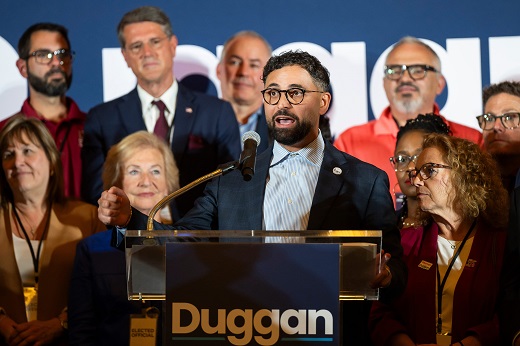Duggan for Governor Michigan
By Craig Mauger
The Detroit News
(The Detroit News) — The Michigan Democratic Party is cutting off access to its main voter data program for Democrats who endorse Detroit Mayor Mike Duggan’s independent campaign for governor.
Curtis Hertel Jr., chairman of the Michigan Democratic Party, on Thursday confirmed the move.
The development marked an escalation by the Michigan Democratic establishment in its effort to oppose Duggan, the mayor of Michigan’s largest city and a former Democrat who’s seeking the state’s top political office in 2026.
Candidates who are members of the Democratic Party usually can get access to a program known as VAN, or the Voter Activation Network, which features detailed data on voters across the state that can be used to design door-knocking, phone-banking or mail campaigns.
“The Voter Activation Network is a set of tools for interacting with the voter data to contact voters,” a presentation on the Michigan Democratic Party’s website says of the program.
However, after Duggan’s campaign unveiled endorsements from more than 200 current and former elected officials on Tuesday, the Michigan Democratic Party issued an internal directive to block access to VAN for Democrats on the list.
Among them was Mo Baydoun, the Dearborn Heights City Council chair, who is running this year to be mayor of Dearborn Heights. Baydoun spoke at a Duggan campaign event in Detroit Tuesday night. Then, on Wednesday, Baydoun’s team discovered that it had lost its access to VAN.
“They cut it off,” said Hussein M. Dabajeh, the senior adviser to Baydoun’s mayoral campaign.
Dabajeh said Baydoun liked that Duggan, who’s been mayor of Detroit for three terms, has been able to bring together Republicans and Democrats.
Of the party’s decision to drop Baydoun’s VAN access, Dabajeh said, “Immature might be a word to use.”
Dabajeh said there were other companies offering the same services that had been provided through VAN.
But Adrian Hemond, a Democrat and longtime Michigan political consultant, said it will likely be more expensive for Democratic candidates who support Duggan to get their voter data from other places than the Michigan Democratic Party.
“It’s an annoyance for the candidate,” Hemond said of the impact of the decision.
The party’s move also means that candidates who endorse Duggan won’t be entering information from their door-knocking and phone-calling efforts into VAN, he said.
“It’s not great for everyone involved going into the election next year,” said Hemond, CEO of the Lansing-based firm Grassroots Midwest.
Three Democrats are campaigning for their party’s nomination for governor: Secretary of State Jocelyn Benson of Detroit, Lt. Gov. Garlin Gilchrist II of Detroit and Genesee County Sheriff Chris Swanson of Fenton.
The Democratic nominee will ultimately have to compete with Duggan and the eventual Republican nominee in the November 2026 general election.
It’s unclear how many Democrats who endorsed Duggan have been actively using VAN, because few of the names on the list are currently candidates. For example, in a text message, Mark Bernstein, a University of Michigan regent and prominent Democratic donor who endorsed Duggan, said he had “no idea” whether he had lost access to VAN.
After Duggan held a big event Tuesday evening at Detroit’s recently restored train depot, Hertel blasted the three-term mayor, saying he “has refused to stand up for those losing their health care and collective bargaining rights” and had chosen “to cozy up to major pro-(President Donald) Trump, anti-labor donors who just want to drag Michigan backwards.”
Duggan’s donor list includes some Republican heavyweights, such as Ron Weiser, a wealthy Ann Arbor real estate developer and a former chairman of the Michigan Republican Party. Weiser was a major backer of Michigan’s 2012 right-to-work law, which banned union membership as a condition of employment in unionized workplaces. In June, Weiser donated $8,325 to Duggan’s campaign, the maximum donation an individual can make to a candidate for governor, according to campaign finance records.
J.C. Huizenga, who founded the charter school management organization National Heritage Academies, also gave $8,325 to Duggan’s campaign in March, records show.
“Michigan Democrats will continue to hold him accountable and show Michiganders how Mike Duggan cannot be trusted,” Hertel said in a statement.
Of the Democratic elected officials who endorsed Duggan and will have to run for office again in the future, Hertel added, “I look forward to their independent campaigns.”
On Thursday, Duggan said he wasn’t surprised by the Democratic Party’s VAN decision.
“This is today’s Michigan Democratic Party — toe the line or suffer punishment,” Duggan said. “No room for anyone who thinks on their own. And they wonder why their party image is at an all-time low.”
Duggan’s campaign unveiled its endorsement list during an event at Michigan Central Tuesday evening.
Among the names were five members of university boards who were nominated for their statewide elected positions by Michigan Democrats, including Bryan Barnhill and Anil Kumar, governors at Wayne State University, whose seats are up for election next year.
Barnhill said Thursday that he hadn’t checked whether he could access VAN but understood the party was going to do what it needed to do.
He said he hasn’t decided whether he’ll seek another eight-year term next year.
Barnhill, who previously worked for Duggan at City Hall, said he was confident Duggan could do similar things for the state that he has done for Detroit.
“If he succeeds, it will be a powerful statement for the rest of the country that there is still opportunity and chance for people to come together,” Barnhill said.
©2025 The Detroit News. Visit detroitnews.com. Distributed by Tribune Content Agency, LLC.


